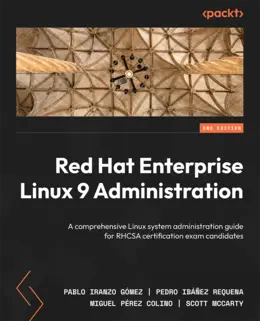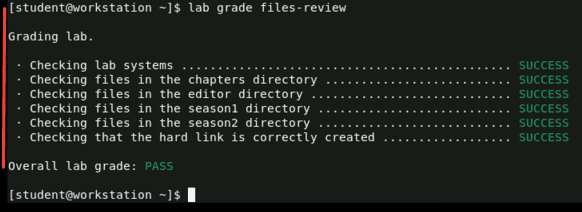Instructional Contact Hours
This is a three (3) credit-hour lecture/lab course. Plan to spend 2.5 hours per class period working on assignments.
Minimum Expectation for Hours Spent on Out-of-Class to Complete Coursework
Plan to spend at least 3 hours on homework weekly. Accelerated courses will require additional time per week.
Required Texts, Materials and Technologies
This course is taught using the official Red Hat curriculum and virtualized Red Hat Enterprise Linux systems that are similar to what you will use on the Red Hat certification exam. Course material is available online and is provided by Red Hat free of charge.
Recommended Textbook

Available from Packt Publishing as a paperback book, ebook, or by monthly subscription to help you continue your preparation for the Red Hat RHCSA exam.
Reliable Access to a Computer with Internet Connection
Most of your course work will be completed online. You are expected to have regular access to a computer with a stable internet connection.
Webcam and Microphone
Since this course includes synchronous online sessions via Zoom, you’ll need both a functional webcam and microphone for full participation. Most modern computers come equipped with these; however, external devices can also be used or purchased if necessary.
Third-Party Learning Tools
Red Hat Academy Learning Portal
Red Hat provides the curriculum as well as a virtual lab environment for this course on the Red Hat Academy Learning Portal. This is provided at no charge to you.
Zoom Video Conferencing
I will use Zoom for our live sessions. A meeting link will be available in MCC's Canvas. If you're unfamiliar with Zoom, you can join a test meeting. to confirm your camera and microphone work properly.
About Your Instructor
I'm passionate about helping students build the skills they need for today's tech careers.
As a Red Hat Academy instructor, I teach using Red Hats official curriculum designed to prepare you for the Red Hat Certified System Administrator (RHCSA) exam.
Outside the classroom, I'm a Quality Matters Peer Reviewer, a certified AWS Instructor, and hold credentials from MIT's Sloan School of Management and the University at Buffalo. I also hold a Certificate of Completion in Generative AI from Purdue University, reflecting my commitment to staying current with emerging technologies like artificial intelligence.
If you're ready to gain real-world Linux skills, this is the class for you.
How to Contact Me
Instructor: Dennis Kibbe
Email: dennis.kibbe@mesacc.edu
Teleconferencing: Request a Zoom meeting.
Office Location: BA 40 Room: BA 025
Office Hours: My office hours are posted on my contact page
Office Phone: (480) 461-7246
Faculty Regular and Substantive Interaction Practices
In response to the US Department of Education's requirement for regular and substantive interaction (RSI) for online courses, you can expect the following interactions in Canvas. Your instructor will:
- Monitor your academic engagement and success and will contact you regarding your progress via the Canvas Inbox.
- Regularly provide explanations, examples, or additional course content using Canvas tools to support your learning.
- Provide detailed and personalized feedback via the Canvas Gradebook on your assignments in a timely manner.
- Respond to student questions via the Canvas Inbox within 24 hours with the exception of weekends and holidays.
Course Schedule
Week 1 (26 August & 28 August)
- Module 0: Course Welcome & Overview
- Module 1: Get Started with Red Hat Enterprise Linux
- Module 2: Access the Command Line
- Module 3: Manage Files from the Command Line
Week 2 (2 September & 4 September)
- Module 4: Get Help in Red Hat Enterprise Linux
- Module 5: Create, View, and Edit Text Files
Week 3 (9 September & 11 September)
- Module 6 : Manage Local Users and Groups
- Module 7 : Control Access to Files
Week 4 (16 September & 18 September)
- Module 8 : Monitor and Manage Linux Processes
- Module 9: Control Services and Daemons
Week 5 (23 September & 25 September)
- Module 10: Configure and Secure SSH
- Module 11 : Manage Networking
Week 6 (30 September & 1 October)
- Module 12: Install and Update Software Packages
- Module 13: Access Linux File Systems
Week 7 (7 October & 9 October)
- Module 14: Analyze Servers and Get Support
- Module 15: Comprehensive Review - Manage Files from the Command Line
- Module 15: Comprehensive Review - Manage Users and Groups, Permissions, and Processes
Week 8 (14 October & 16 October)
- Module 15: Comprehensive Review - Configure and Manage a Server
- Module 15: Comprehensive Review - Manage Networks
- Module 15: Comprehensive Review - Mount File Systems and Find Files
Grading Standards and Practices
Letter Grades
Your final letter grade will be determined by the point value of work completed. Quizzes and end-of-chapter labs are graded. Guided Exercises are not graded. Occasionally, Red Hat changes the total point value of a lab mid-class. If this happens I will update the point value of the lab in Canvas. Example, if the point value of a lab was 35 points in Canvas but Red Hat changes it to 30 points I will adjust the points in Canvas to match.
| Grade |
Percent |
| A |
90-100% |
| B |
80-89% |
| C |
70-79% |
| D |
60-69% |
| F |
0-59% |
How I Grade Lab Assignments

You receive 5 points for each PASS or SUCCESS. In this example grading report the total points are 30. For any FAIL the report output will tell you why it failed and you can usually redo just that part of the lab then rerun the grading script to improve your score. Lab assignments can be re-submitted for a higher score.
✏️ When you take the screenshot of the grading report only include the content indicated by the red line in the illustration above not the entire computer screen.
Late Assignments
In this class we cover a lot of material in the short eight weeks we have together. It's important that you set aside time each week to read the textbook and work on the guided labs before class. Studies show that short study sessions spread out over several days are more effective and less stressful than cramming at the last minute.
All lab assignments have a due date along with instructions for what to submit. You should turn assignments in by the due date. Allow yourself plenty of time to complete assignments and make it a habit to submit them by the due date!
⚠️ If you fail to turn in two consecutive lab assignments you are in danger of being dropped from the class.
Course Final
This class does not have a tradition final. Instead Chapter 15: Comprehensive Review serves as the final for this course. You can start on these labs at any time you do not need to wait until the last week of class.
Attendance Policy
This is a hybrid class which means you can attend one of the weekly class session, but not both using Zoom. If you attend with Zoom I insist that you have a working webcam and microphone and ask that you turn on the webcam during your time attending class. If you read the appropriate textbook chapter and complete the guided labs before coming to class you can complete the graded lab in class where it is easier to get help when you need it.
Excused Absences
MCC's policies excuse absences due to college sanctioned events, death of an immediate family member, jury duty, subpoenas, short-term military service, or religious holidays. Signed absence verification forms or accommodation forms are required prior to absence. District Attendance Policy
Artificial Intelligence Statement
AI will impact you in any career you are seeking. We have the power to shape how AI develops when we engage with it thoughtfully. In this course, I encourage you to creatively experiment with AI keeping a couple of things in mind.
AI is a powerful tool that can be used to assist you in the learning process. It can provide initial answers to questions, help clarify concepts, and provide resources and suggestions for further study.
However, AI is not a substitute for human interaction or critical thinking. As a student in my course, you must use generative AI tools with caution and be mindful of their limitations. It is expected that you use AI as a tool to support your learning, actively engage with course material, and use AI as a tool to supplement, not replace, their own efforts.
Misuse of AI includes copying answers without understanding the material or relying on it too heavily. This is the definition of academic dishonesty and may result in loss of credit and other sanctions. Any evidence of cheating, plagiarism, misuse of AI or other academic dishonesty will be taken seriously and may result in disciplinary action.
By continuing in this course, you agree to abide by this policy and to use generative AI in a manner that supports your learning and academic success but does not replace your learning, critical thinking, or the requirement that you demonstrate to me your learning.
Classroom Accommodations for Students with Disabilities
Academic Integrity and Conduct
Learning requires honesty, responsibility, and professional behavior. It is college policy to respond to academic misconduct and dishonesty whether it was committed intentionally or not.
Tuition Charges and Refund
Please see the Course Details section of this syllabus for the refund dates of this course:
District Refund Policy
Helpful Resources for Students
If students need support with academic or basic needs at MCC, such as tutoring and transportation issues, there are resources available. MCC has compiled a list of them, which can be found in the Student Resource Referral Guide.
🩷 MCC Cares
Mesa Community College is committed to providing a personal education for each of our students. When faculty or staff members are concerned about the physical, emotional, academic or personal health of a college student, the support staff can assess the situation, and may contact students to offer support and provide referrals to access the breadth of resources on-campus. Your Care Team
Your Rights and Responsibilities as a Student
It is the student's responsibility to understand the policies listed in this syllabus as these are the guidelines that the instructor will follow for grading, attendance, etc. It is also every student’s responsibility to read and understand the college policies included in the college catalog and/or student handbook as they may apply in the case of an incomplete grade or withdrawal. In addition to this syllabus, all students should be aware of the district Administrative Regulations that articulate student rights and responsibilities.
Changes in the Syllabus or Course Policies
Syllabus policies and course schedule are subject to change to accommodate the needs of the course, by agreement between instructor and all students, or as needed by administration. Students will be notified of any changes in schedule, requirements or policies. Students are responsible for knowing and complying with syllabus information and all college catalog and student handbook policies. Continued enrollment is acceptance of this responsibility.

The Maricopa Community Colleges are EEO/AA Institutions.



